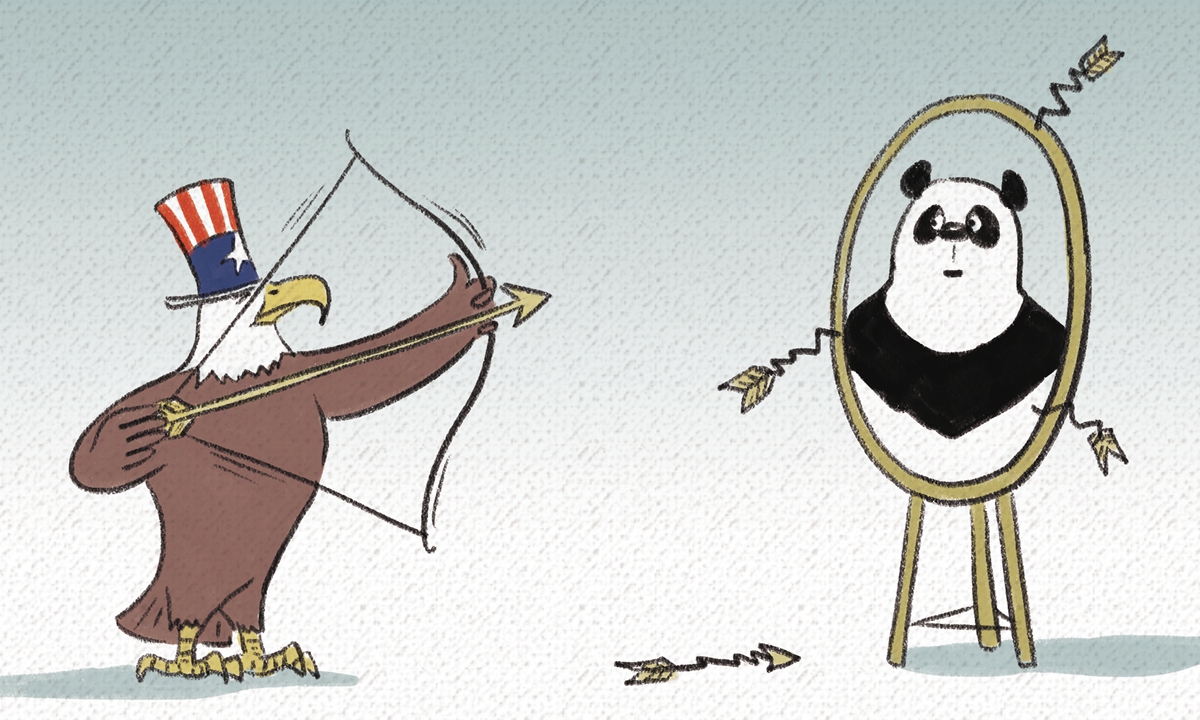Why the US and the West are always obsessed with changing China
By Xu Qinduo Source: Global Times Published: 2020/9/7 17:18:15

Illustration: Liu Rui/GT
The attempt to create a different China has been a theme of Washington's decades-long "engagement" policy with Beijing. Amid escalated China-US tensions, American politicians represented by Secretary of State Mike Pompeo have lashed out even fiercer than before at China. So why are the US and the West so obsessed with changing China?
The mentality to change China comes from a sense of superiority as well as religious zeal, as pointed out by some. As the first to undergo industrialization, the West as a whole is better off than the rest of the world in terms of economy and technology. So somehow they enjoy an advantage by showing little consideration and lecturing other countries on how they should govern.
For practitioners of Christianity, "change" by converting people into Christians comes naturally to them. After all, what's wrong with "spreading God's message"? Some call this a missionary mentality.
When China was forced to open its doors by Opium Wars, it was a poor and backward society. Ironically, China was "changed" to become weaker thanks to consumption of the British opium.
After many defeats, struggles and civil wars, China finally settled into a model led by the Communist Party of China (CPC). This was a wise choice by the Chinese people, who took pride in seeing the true independence of the country in 1949.
Despite China's opening-up to the outside world and constant domestic reforms, its political system is rarely embraced by the Western world. "We had hoped the regime would liberalize once it saw how rich it could become by becoming more Western," says a Washington Post opinion piece.
China has indeed become more prosperous, but not by blindly copying the Western system. Instead, it has absorbed some of the Western practices while maintaining the integrity of its political system.
As a result, today's China can't be more different than the one at the beginning of the reform and opening-up in late 1970s. "Since the publication of Gordon Chang's The Coming Collapse of China in 2001, China's per capita Gross Domestic Product has increased five-fold," says David P. Goldman, president of Macrostrategy LLC, a financial consulting firm.
Commenting on China's achievements, Harvard professor Stephen M. Walt noted, "today, its [China's] per capita income is 65 times higher (~$10,200) than it was 42 years ago, and it is now the world's second-most powerful country." He stressed that, "Most importantly, these achievements are due primarily to internal reforms within China and the energy of the Chinese people themselves - and not to any particularly clever foreign-policy coup."
If a country has been as successful as China, why should Washington continue to be bent on "changing China"?
By "change," Washington often refers to "regime change" in another country; or more specifically in the Chinese situation, the sabotage of the ruling Party. But one major reason that China has gone so far is due to the leadership of the CPC. Chinese people see no reason to change their political system, as revealed in a decade-long Harvard study that was released in July, "From the impact of broad national policies to the conduct of local town officials, Chinese citizens rate the government as more capable and effective than ever before."
What's the true purpose of the US campaign to change China? Do they think that the endless attack on China, including the campaign to suppress Huawei and TikTok, as well as crackdown on Chinese scholars and students in the US, are for China's good? The more likely explanation is the US feels that its global preeminence has been challenged by China's successes. Washington thus is doing all it can to slow down the rise of a major strategic competitor.
In the mean time, the US continues to moralize against China over issues such as freedom and human rights. But the concept of freedom varies from country to country. For example, few countries would allow widespread gun ownership like that in the US or have their national leaders support conspiracy theory groups such as QAnon, like Trump does.
On human rights, more than 6 million Americans are infected with COVID-19 and more than 180,000 people have died. This is mostly due to the dereliction of duty of the US government as well as its incompetency. Alas, they couldn't even protect the basic rights of those Americans whose lives are supposed to be protected along with liberty and the pursuit of happiness there.
With massive social unrest, unprecedented divisions between the right and the left, and a widening gap between rich and poor, the US, despite its penchant for regime change, may find it's overdue to focus on its own business and fix its own problems.
At the same time, China, with its successful handling of COVID-19, has emerged as the only major economy to record positive growth this year. The call to change China has ill intention and sounds rather hollow.
The author is a senior journalist and political analyst at China Media Group. opinion@globaltimes.com.cn
RELATED ARTICLES:
Posted in: VIEWPOINT